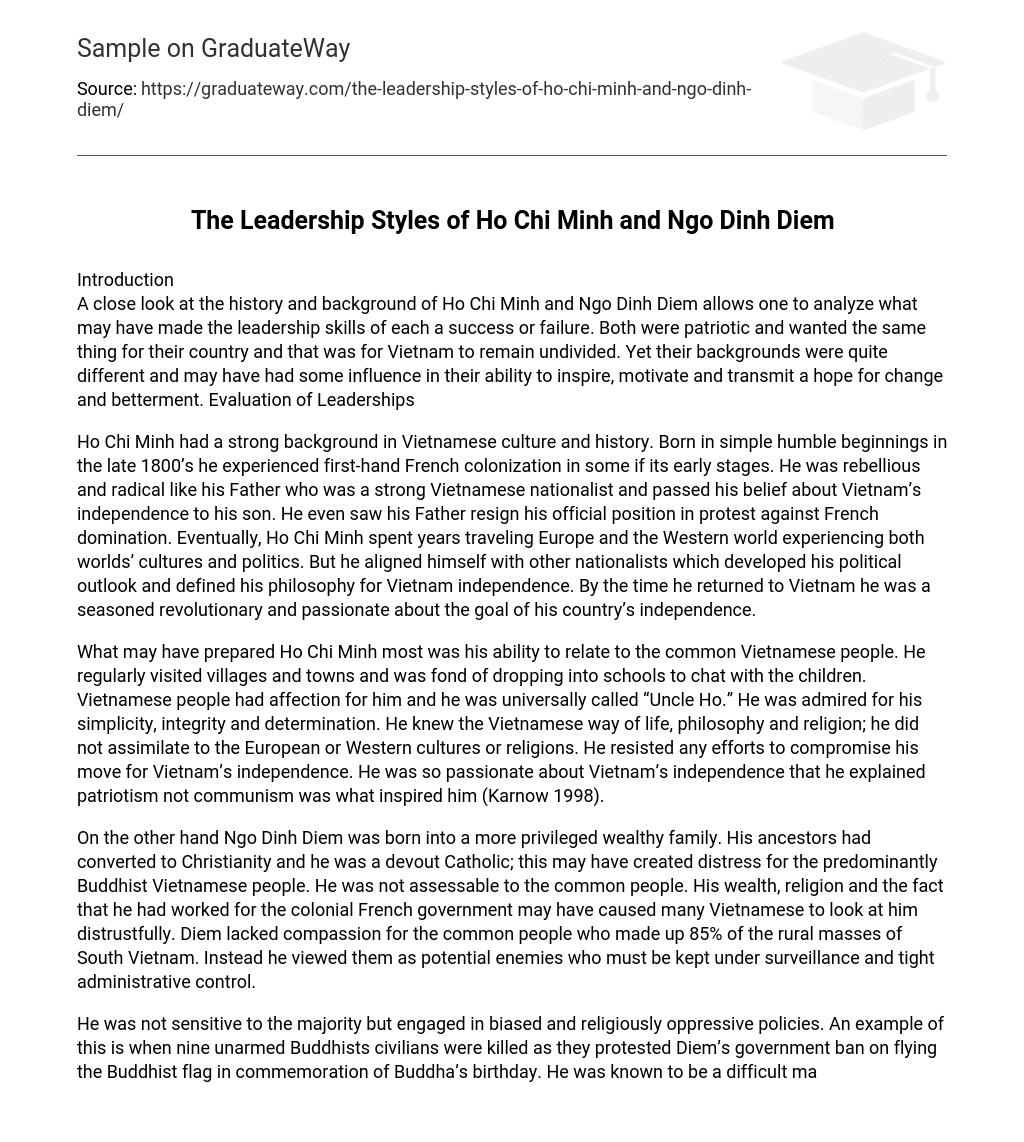Introduction
A thorough examination of the history and background of Ho Chi Minh and Ngo Dinh Diem enables one to evaluate the factors that contributed to their success or failure as leaders. Despite both being patriotic and desiring a unified Vietnam, their backgrounds varied significantly, which potentially influenced their capacity to inspire, motivate, and instill hope for progress and improvement. Evaluation of Leadership
Ho Chi Minh demonstrated a profound understanding of Vietnamese culture and history. He was born into modest circumstances in the late 1800s and personally observed the initial phases of French colonization. Inheriting his father’s nationalism, Ho Chi Minh possessed a rebellious and radical nature, sharing his father’s unwavering belief in Vietnam’s autonomy. He even witnessed his father resign from his official position as a form of protest against French domination. Following extensive travels throughout Europe and the Western world, Ho Chi Minh found common ground with fellow nationalists, shaping his political ideologies and firmly establishing his philosophy regarding Vietnamese independence. Upon returning to Vietnam, he had transformed into an experienced revolutionary driven by an intense passion for the liberation of his country.
Ho Chi Minh’s ability to connect with the common Vietnamese people may have been his most significant preparation. He regularly visited villages and towns, and had a special fondness for dropping by schools to engage in conversations with the children. The Vietnamese people held a deep affection for him and universally called him “Uncle Ho.” His simplicity, integrity, and unwavering determination earned him admiration. Ho Chi Minh had a profound understanding of Vietnamese way of life, philosophy, and religion, and he never assimilated into European or Western cultures or religions. He staunchly resisted any attempts to compromise his fight for Vietnam’s independence. His passion for Vietnam’s independence was so intense that he claimed his inspiration came from patriotism rather than communism (Karnow 1998).
On the one hand, Ngo Dinh Diem came from a privileged and wealthy family, with ancestors who had converted to Christianity. As a devout Catholic, this might have caused some distress for the predominantly Buddhist Vietnamese population. Additionally, Diem’s wealth and his history of working for the colonial French government may have led many Vietnamese to view him with suspicion. Furthermore, Diem showed a lack of empathy towards the common people, who made up 85% of the rural population in South Vietnam. Instead of seeing them as fellow citizens, he regarded them as potential threats who needed to be closely monitored and tightly controlled.
Despite his insensitivity to the majority and engagement in biased and religiously oppressive policies, Diem’s actions were evident. A notable example was the ruthless killing of nine unarmed Buddhist civilians who were protesting against Diem’s ban on flying the Buddhist flag in honor of Buddha’s birthday. Diem’s management style was notorious for his difficulty in reasoning and collaborating with others. He not only micromanaged even the tiniest details but also seemed incapable of seeing the bigger picture. Trusting only a select few family members, he refused to expand the reach of his government and rejected negotiations with numerous rivals (Moss 2010). However, Diem’s political philosophy and authoritarian governing methods incited opposition and hindered his pursuit of much-needed support.
Conclusion
Both Ho Chi Minh and Ngo Dinh Diem possessed distinct leadership qualities. They both showed intelligence, diligence, and a strong dedication to their country. Ho Chi Minh effectively addressed the needs of the Vietnamese people by understanding Vietnamese culture, society, and economy. He displayed a deep passion and unwavering determination to make Vietnam self-reliant and develop a robust internal infrastructure.
In contrast, Diem lacked an understanding of the Vietnamese people despite being a nationalist. He relied on assistance from the United States and prioritized American interests. His discriminatory treatment towards religious groups and oppressive actions against dissenters resulted in alienation among most Vietnamese citizens.
There are numerous books and articles that explore the lives of these two individuals. It is interesting that even those who oppose communism still recognize Ho Chi Minh’s leadership abilities.
References
Karnow, J. (1998, April 13). Ho Chi Minh. Time Magazine. Retrieved from
www.time.com/time/magazine/article/0,9171,988162,00.html
Moss, G.D., (2010). Vietnam: An American Ordeal (6th Ed.). Upper Saddle River, NJ:
Prentice Hall.





